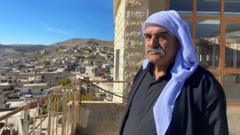The village of Hadar, located an hour's drive from Damascus, has become a focal point for Israeli military operations in Syria following recent political changes. Two military vehicles and several Israeli soldiers are stationed at an unofficial checkpoint, revealing Israel's ongoing incursions into Syrian territory, specifically a UN-monitored buffer zone established over five decades ago.
"We want to hope, but we'll have to wait and see," expressed Riyad Zaidan, a local resident, as the presence of Israeli forces has turned into a daily reality. The village chief, Jawdat al-Tawil, highlighted the historical significance of the Golan Heights, occupied by Israel since 1967, and noted that many villagers have family members living in that territory.
Despite recent assertive actions by Israel, including multiple airstrikes across Syria and plans to expand settlements in the Golan Heights, the interim Syrian leadership under Ahmed al-Sharaa has expressed a desire to avoid conflict. They highlighted that Israel's military activities could provoke unnecessary escalation in an already fragile region.
Residents of Hadar, primarily from the Druze community, maintain a unique perspective. Their historical roots and complex relationship with Israel, following the 1967 Golan Heights conflict, have led some members to choose Israeli citizenship. While some local leaders have expressed a willingness to engage with groups like Hayat Tahrir al-Sham (HTS), fears remain about Israel's motives, including potential territorial expansion.
Israel has significantly heightened its military presence in the region to counter threats from jihadist groups linked to Iran, perceiving the recent changes after Assad's fall as a potential security risk. "The immediate risks still remain," stated Israeli Defence Minister Israel Katz, emphasizing the necessity for military interventions.
While many Druze in Syria feel marginalized by previous regimes and see complicated alliances forming, they also desire peace following years of conflict. Zaidan encapsulates this sentiment, stating, "We've had enough war, enough blood, enough hard life – we need to stop."
Jawdat al-Tawil reflects uncertainty about the new governances in Syria, reminiscing about past conflicts with HTS. He expressed cautious hope that the group might fulfill promises of justice and respect for all communities, despite their violent history.
As conditions evolve, residents like Zaidan eagerly await stability, transcending political divides and opting instead for a unified cry for peace. The echoes of a collective longing for an end to violence resonate deeply as the region faces a pivotal moment in its turbulent history.














